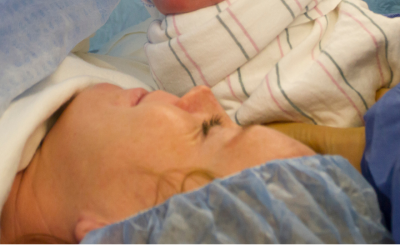
COVID-19 in Pregnancy and Risk for Preeclampsia
Maternal and Neonatal Morbidity and Mortality Among Pregnant Women With and Without COVID-19 Infection: The INTERCOVID Multinational Cohort Study
As the COVID-19 pandemic continues to linger, more data are becoming available about what possible links there may be between COVID-19 infection in pregnancy and risks to mothers and their babies. In this study, research teams from around the world came together to study pregnant women with COVID-19 infection to ask what outcomes in mothers or their babies could be linked to COVID-19. Researchers found the risk for preeclampsia was 76% higher in a study group of 706 women who had COVID-19 during pregnancy (compared to a group of pregnant women without COVID-19 diagnosis). In a smaller analysis in their study of only pregnant women with COVID-19 infection but without any symptoms (i.e., asymptomatic), researchers still found a 63% increased risk for preeclampsia in the asymptomatic women. Researchers also found increased risks for severe infection and preterm birth in women with COVID-19 infection in pregnancy. Studies like these are important to understand how COVID-19 illness may affect pregnant women and can be taken into account when making decisions about social distancing, masking, and vaccination.
LINK: https://pubmed.ncbi.nlm.nih.gov/33885740/
About Research Roundup
Each quarter, our team of researchers reviews the most current studies related to hypertensive disorders of pregnancy and selects those studies they feel will be of greatest interest to our community to summarize.
Special thanks to our volunteer research team, who under the leadership of Dr. Elizabeth Sutton, make Research Roundup possible: Alisse Hauspurg, MD Felicia LeMoine, MD Jenny Sones, PhD, DVM, and Robin Trupp, PhD, RN.
Related Articles

Your story is needed to improve outcomes for moms like you. Add your voice to critical preeclampsia research to ensure that every story is heard.

Frequently asked questions about the Preeclampsia Registry, a patient-driven registry and biobank.

The Preeclampsia Foundation offers research funding, study recruitment, and other patient engagement services to researchers.

We provide research grant funding to advance progress towards detection, prevention, or treatment of preeclampsia, HELLP syndrome, and other hypertensive disorders of pregnancy.

Recent findings in preeclampsia research have shown that preeclampsia likely has at least two variants – an early onset and a late onset variant. Early onset is typically defined as before 34 we...

Preeclampsia is a pregnancy complication marked by new-onset high blood pressure and signs of stress on organs such as the kidneys, liver, and brain. While much attention is often given to preterm dis...

Preeclampsia is a serious problem that can happen during pregnancy. It often affects the brain and can cause headaches, vision problems, strong reflexes, and seizures (called eclampsia). In this study...

Pregnancy offers a unique window into a woman’s future heart and cardiovascular health. Conditions such as hypertensive disorders of pregnancy (HDP) which include gestational hypertension, preec...

Heart disease, also called cardiovascular disease (CVD), is becoming more common in young women across the United States. Hypertensive disorders of pregnancy (HDP) is a group of conditions that includ...


